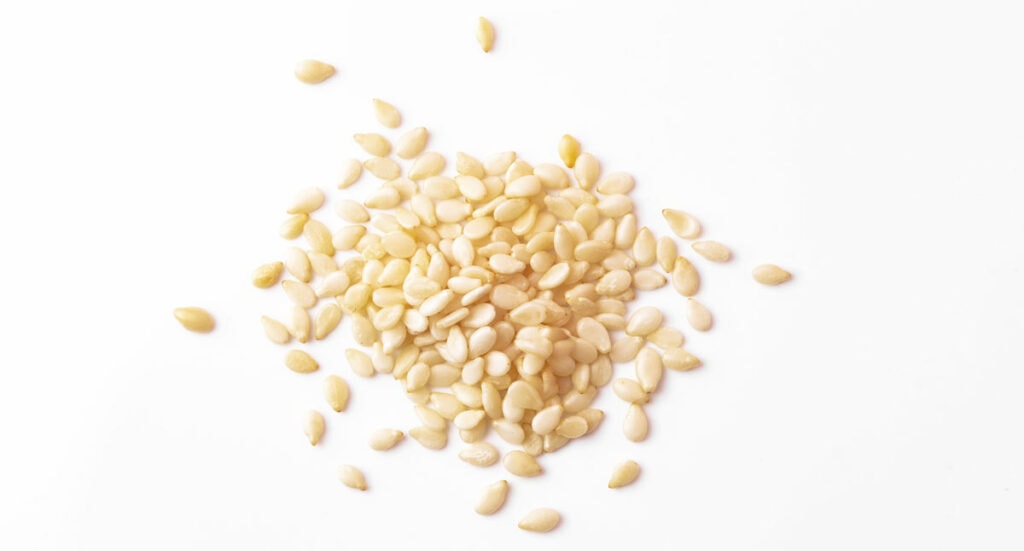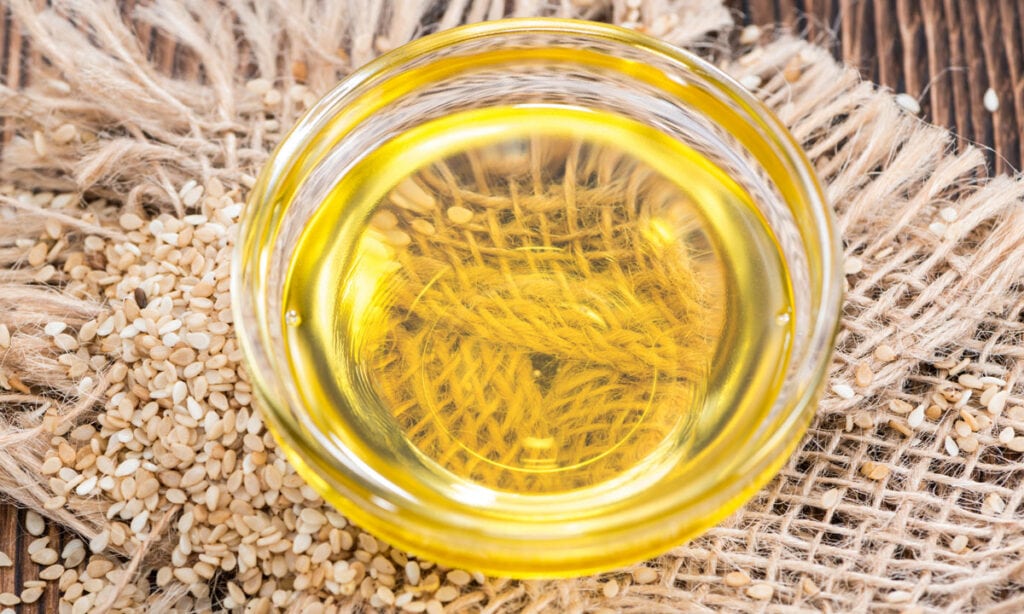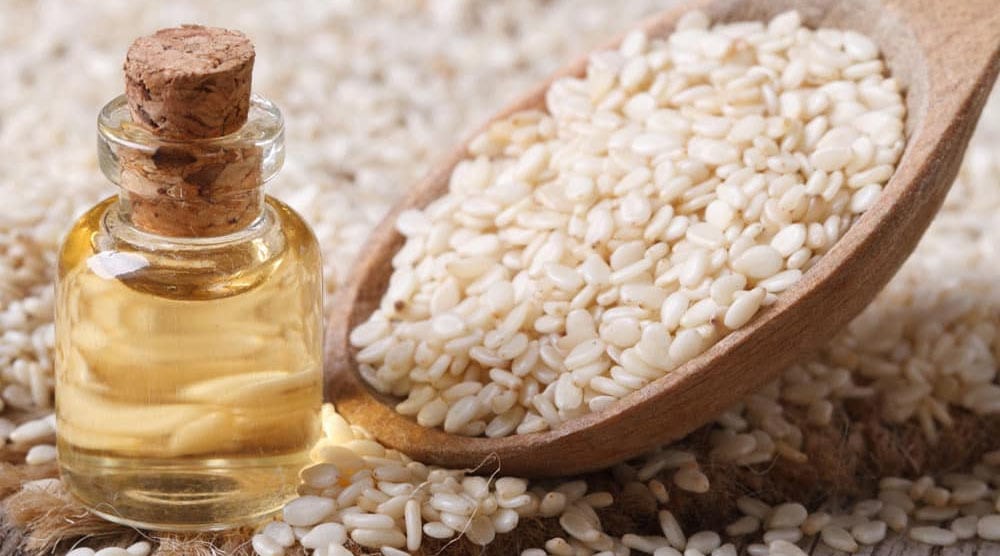Sesame seeds contain plenty of fiber, calcium, and vitamins. But are they safe for dogs to eat? Keep reading to find out.
Sesame seeds are a common ingredient on burger buns, in salads, and pressed as an oil. But can dogs eat sesame seeds?
The good news is that sesame seeds aren’t toxic to dogs, so you usually don’t need to worry if your dog eats some. The exception is if your dog is allergic.
That doesn’t mean sesame seeds should be a regular part of your dog’s diet though. Dogs find the seeds difficult to digest, so they are unlikely to provide much health benefit.
Contents
Can Dogs Eat Sesame Seeds?

Sesame seeds are generally non-toxic for dogs to eat, so there’s no need to worry if your dog sneaks a burger bun at a family BBQ.
It’s possible that a dog could have an allergy to a sesame seed though. Sesame seed allergies are among the top ten human allergens, although they are much less commonly seen in dogs.
If your dog does have a sesame allergy, eating sesame seeds could cause stomach upsets, itchiness, and skin irritation. A severe allergic reaction could cause respiratory issues, so you shouldn’t delay in seeking advice from your vet if you think your dog is having a reaction.
What Are The Benefits of Sesame Seeds?
Sesame seeds contain a host of vitamins and minerals that could benefit your dog. These include:
- Sesamin and sesamolin. These micronutrients can increase vitamin E and help protect the liver
- Calcium. This essential nutrient helps maintain strong teeth and bones
- B Vitamins. Sesame seeds are a great source of B vitamins, especially thiamine. This can help promote healthy nerve, muscle, and heart function.
- Antioxidants. These can help prevent cell damage in animals
- Immune boosting nutrients. Sesame seeds contain copper, zinc, iron, and selenium, which could all help to boost the immune system
Sesame seeds are also high in dietary fiber. Fiber aids digestion, helps your dog feel fuller for longer, and promotes healthy bowel movements. However, in reality, it’s unlikely that a dog would benefit from the fiber in sesame seeds.
“While sesame seeds do contain fiber, the amount a dog would have to eat would be very large indeed,” says vet Dr Linda Simon. “If an owner wanted their dog to eat more fiber, there are high fiber diets and supplements that we can get them started on.”
Although sesame seeds have plenty of nutritional benefits, they aren’t a natural food for dogs to eat. This means they can be difficult for your pet to digest. If they come out the other end undigested, your dog won’t absorb the beneficial nutrients.
For this reason, sesame seeds probably shouldn’t be part of a well-balanced canine diet. Your dog should get the nutrients they need from more appropriate sources.
Tip: It’s always a good idea to consult with a qualified canine nutritionist before adding foods to your dog’s diet. He or she can help you pick foods that are easy for dogs to digest.
Can Dogs Eat Sesame Oil?

A small amount of sesame oil is unlikely to be a problem for your dog. However, sesame oil is high in fat and calories, which is unhealthy for your pet. It could also cause your dog to have a stomach upset.
Feeding a high-fat food like sesame oil could even trigger pancreatitis in your dog. This is a serious condition caused by inflammation in the pancreas. Chronic cases need careful life-long management, and in severe cases, it can be life-threatening.
Sesame oil is sometimes applied to dry flaky skin though. It’s full of fatty acids and vitamin E, and both are known for their moisturising properties.
“I find oils like salmon oil are much more effective at improving skin health in dogs. My patients tend to prefer the fishy taste,” says vet Dr Linda Simon.
Are Any Other Seeds Safe for Dogs?
Seeds are increasingly popular in human diets. Unfortunately, while seeds are often packed with vitamins and minerals, there’s little research available on their benefits for dogs. They are also high in calories, so they shouldn’t make up a significant part of your pet’s diet.
Here are a few non-toxic seeds that can be fed to your dog in moderation:
- Sunflower seeds. These seeds are a good source of antioxidants. Make sure they are raw, unsalted, and shelled.
- Chia seeds. These should always be soaked as they expand in the stomach. They’re rich in fatty acids, high in fiber, and contain minerals like manganese, copper and zinc.
- Hemp seeds. These seeds are growing in popularity for dogs. They’re packed with vitamins, minerals, proteins, and fatty acids. “More of my clients are asking about hemp for their dog,” says Dr Linda Simon. “Reported benefits can include calming and anti-inflammatory effects. Studies are in their infancy, but it is a promising ingredient.”
- Flaxseeds. Also referred to as linseeds, flaxseeds contain lots of protein and fiber, and have proven anti-inflammatory properties.
While some seeds are safe for dogs, fruit pits certainly shouldn’t be given to your pet. Not only are they a potential choking hazard, but they also often contain toxic ingredients.
Nectarine pits, for example, contain amygdalin, which could cause cyanide poisoning if enough was consumed. Avocado pits contain persin, which can give your dog an upset stomach.
Summary
Sesame seeds aren’t toxic for dogs. Eating a few probably won’t harm your pet, unless he has an allergy.
The advantages of adding sesame seeds to your dog’s diet are still being debated though. They aren’t easy for your dog to digest, which means many of the nutritional benefits are likely to be lost.
Sesame seeds are also high in calories and fibre, so they could cause a stomach upset if too many are eaten. These risks are even higher for sesame oil, which shouldn’t be fed to a dog. For more information about seeds and dogs, read our guide to whether dogs should eat poppy seeds.




